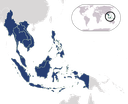Upcoming conferences at the University of Copenhagen and University of Göttingen
6th annual International Conference Intra-Asian Connections: Interactions, flows, landscapes
22-24 October 2014 - Asian Dynamics Initiative - University of Copenhagen
The Asian Dynamics Initiative (ADI) is pleased to announce the conference 'Intra-Asian Connections: Interactions, flows, landscapes' to be held at the University of Copenhagen on 22-24 October 2014. The conference will take place over three days and feature distinguished keynote speakers as well as panels emphasizing intra-Asian connections in order to highlight the historical contingency of modern borders and hence of area studies themselves. Through comparative and cross‐border perspectives we seek out opportunities to rethink the ‘maps in our minds’; to theorize alternative temporalities, spatialities and modernities that emerge when Asia is not simply cast in opposition to the West; and to seek alternative epistemological grounding in conceptualizations of interactions, flows, and more dynamic landscapes.
'Intra-Asian Connections: Interactions, flows, landscapes' is the sixth in a series of annual, interdisciplinary conferences initiated by ADI in 2008. ADI is a cross-faculty and interdisciplinary effort to meet the current challenges and demands for better knowledge of and deeper insights into Asian matters.
For the Call for Papers, please see http://asiandynamics.ku.dk/english/intra_asian_connections/
Oscar Salemink
Professor in the Anthropology of Asia
Department of Anthropology
Faculty of Social Sciences
University of Copenhagen
Øster Farimagsgade 5
1353 København K.
Denmark Office: CSS - Bygning 16, Opgang i, room 16.0.24
TLF +45-35 32 44 72
FAX +45-35 32 35 65
o.salemink@anthro.ku.dk
http://anthropology.ku.dk/staff/academicstaff/?id=403491&vis=medarbejder
Summer School "Cityscapes and New Religiosities in Asia"
10-17 August 2014, University of Goettingen (Germany)
Application Deadline: 15 March 2014
China, Southeast Asia and India are entangled not only through complex histories, but also through multi-faceted contemporary ties in the political, religious, economic and cultural sphere. India and China now boast strong and steadily growing economies and are already global political and economic players, while the Southeast Asian states are eager to follow them: ASEAN as a politically and economically ambitious alliance has become an actor to be counted for in Asia. The booming Asian economies have not only affected the economic sphere. Rapid urbanization, the emergence of an aspiring middle-class, the spread of consumer culture and a growing civil society are also features of these transformations. Cities are the future in Asia: the World Development Bank estimates that within the next 20 years, 1.1 billion people will move to cities in Asia. In 2030, 55 per cent of Asia’s population will live in urban environments.
While modernisation was long believed to result in secularism, Asian modernities refute this thesis as euro-centric: far from becoming secular, Asian societies see a revival, a reformulation and transformation of religion in modernity, and striking religious dynamics. Religion is not an antithesis to modernity but is in complex interaction with it. Since modernity implies a number of far-reaching social, political, and economic changes, it results in not only new aspirations and practices, but also in new constraints and fears. These are articulated and addressed in religious practices and ways of expression, in new conceptualisations of religion or, in extreme cases, in acts of religiously motivated violence. Cities are spaces of longing in Asia, as they promise a modern lifestyle, economic opportunities, global connectedness, entertainment and educational upward mobility. At the same time, they stand for the loss of social and economic safety nets, for changing norms and values and the loss of close social relationships. Religious life in the city is an answer to these hopes and fears and to the changing social make-up of communities.
The Summer School “Cityscapes and New Religiosities in Asia” brings the contexts of ‘religion’ and ‘urbanity’ in Asia to the centre stage. It will engage with urban spaces and religiosities through case studies especially in India, China, Vietnam, Thailand, Singapore, and the Philippines. While paying attention to the specific contexts and ethnographic details of the case studies, we will also make visible their transnational and transurban connections, as urban spiritual lives and spirit worlds have been informed by the changing cultural maps of migration, adaptation, and transformation across Asia. Metropolitan centers are particular receptacles and laboratories for such global encounters, as they interweave with middle-class consumer power and diasporic identities.
The summer school therefore invites participants to engage with, and develop, their own work through an exploration of three key thematic intersections, including (1) transformations of religious sites in contexts like architecture, city planning, heritage, urban place-making and re-habitation; (2) religious communities, in which different classes, castes, generations, ethnicities and genders intersect; and (3) religion and media, exploring how spirituality is visualised, sensed, communicated, staged or experienced across urban landscapes. With this explicitly transurban focus, we also acknowledge the growing imperative for a “global-studies” perspective in postgraduate research, through which new demands are placed on students to manage the disciplinary boundaries of “regional” or “area studies”, while wondering what actual research tools they need to do so effectively and competently within the limited time frame of a thesis.
Speakers
Lily Kong (National University of Singapore)
Dan Smyer Yü (Max Planck Institute for the Study of Religious and Ethnic Diversity, Göttingen)
David A. Palmer (University of Hong Kong)
Julius Bautista (National University of Singapore)
Andrew Alan Johnson (Yale-NUS College)
Sanjay Srivastava (Delhi University)
Rupa Viswanath (University of Göttingen)
Michael Dickhardt (University of Göttingen)
While keynotes and morning lectures will provide theoretical frames and ethnographic snapshots from diverse Asian cityscapes, the summer school’s main focus will be on small working and reading groups moderated and mentored by each of the invited speakers over two-day units. Mandatory readings for these sessions will be shared in advance. Participants will have the opportunity to introduce their own work, especially through a poster but we do not expect full presentations. Instead, students will be invited to use the working groups to connect their research to each of the three theme blocs, in order to develop new ideas and learn new approaches for their own work. All students will have to actively participate in the working formats of all three topics to gain a comparative perspective and to broaden their horizons beyond the limits of their own PhD-projects. While the two-day units take off with a strong input from outside, the students are expected to work with growing autonomy over the course of the unit.
As a follow-up to the summer school, we will also feature an essay competition for interested participants, with the best paper selected for submission in an edited volume prepared by DORISEA in 2014.
About the organizers
DORISEA and CETREN are two key platforms building research, network and outreach capacities in the study of religions at Göttingen Research campus (GRC). Bringing together scholars in the humanities and social sciences for inter-disciplinary dialogue, the networks in particular foster an appreciation of regional diversity and intra- and cross-regional entanglements in Asia. With DORISEA’s expertise on Southeast Asia and CETREN’s core competence in China and India, both networks complement each other, join creative forces and pool their excellent academic networks to organise this summer school.DORISEA and CETREN as interdisciplinary area study research networks opt for a Summer School with a decidedly transregional studies character. Instead of limiting the study of religion in Asia to one discipline alone, we strive to combine the disciplinary competences of social and cultural anthropology, history, sociology, media and visual studies, religious studies, and area studies.
Applications
We invite applications from interested doctoral and research-based masters’ students of all cultural-studies disciplines, whose work relates to East, South and/or Southeast Asia. We offer expertise especially in social and cultural anthropology, history, sociology, media and visual studies, religious studies, and area studies. The number of participants is limited to 20.
Applicants should submit an abstract of their thesis or dissertation (max. 500 words), a statement of motivation (max 1 page), a brief statement by the applicant’s supervisor, as well as proof of current university enrollment.
Scholars of DORISEA and CETREN will select the participants. Free accommodation will be provided. A participation fee of 250 Euros will be charged. Fee waivers and travel stipends will be available to fund participants otherwise unable to attend due to the financial burden of travel costs. Please e-mail your application to Karin Klenke at dorisea@uni-goettingen.de.
Application deadline: March 15, 2014.
Successful applicants will be informed by the end of March.
Please see our Summer School website at http://www.dorisea.de/de/node/1502.
Dr. Karin Klenke
Research Network "Dynamics of Religion in Southeast Asia"
Department of Social and Cultural Anthropology
University of Goettingen
Berliner Straße 28
D - 37073 Goettingen
Germany
Phone +49(0)551 39-20153
Fax +49(0)551 39-7359
E-mail dorisea@uni-goettingen.de
www.dorisea.net









